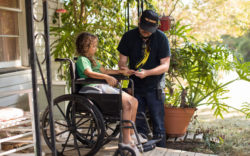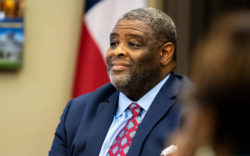Athens is a lot like New York’s Harlem.
Granted, Harlem probably has a few more jazz clubs. And Athens has more open space. But when it comes to demographics, both communities struggle with a high poverty rate. As a result, more kids drop out of school or face teen pregnancy than in other, more affluent communities.
And while Athens doesn’t have its own version of Geoffrey Canada, the educator profiled in Paul Tough’s first book, Whatever It Takes, it does have an arsenal of partnerships and programs in place to combat poverty at multiple stages of a child’s life.
Tough, who visits Athens on Monday with his newest book, How Children Succeed, focuses on a multi-pronged attack against multi-generational poverty. Breaking the cycle starts before a child is even born and continues, through parenting techniques and stimulating brain development, until the teen years. This approach, unheard of in Athens a few years ago, recently found a foothold in both Clarke County public schools and nonprofits looking for new ways to help kids find as many opportunities as possible.
The Clarke County School District, for example, has specialists like ESOL (English for Speakers of Other Languages) teachers who work one-on-one with children struggling in class because of a language barrier. Early-intervention teachers help students in specific subject areas. Family-engagement specialists help connect parents to outside resources such as counseling, discipline help or other social services. Because the Clarke County School District receives Title I money from the federal government, each school can hire support staff.
“There are a number of community and school supports in place for all students; these include family engagement specialists, graduation coaches and the work of a variety of nonprofits,” CCSD spokeswoman Anisa Sullivan Jimenez says. “We lengthened extended-learning time to provide more enrichment and remediation, and there are multiple tutoring programs in place.”
CCSD has partnerships with several nonprofits, including the Athens YMCA and the Boys & Girls Clubs. Through grants and scholarships, these organizations offer after-school and summertime opportunities for kids to learn from positive role models, play sports and get extra homework help, rather than simply hanging out at home.
“We teach our kids acceptance, the importance of diversity, knowing that everyone has a story and about unconditional love,” says Shae Wilson, associate executive director at the Athens YMCA, where the district buses 330 students from 21 schools. “We have the richest of the rich and the poorest of the poor come in daily, and as we always say, we are just Y kids when we hit the black mat.”
At the Boys & Girls Clubs, a different partnership with the school district allowed the clubs access to a three-year federal grant that pays for after-school programming. Several years ago program leaders noticed that despite lessons in character development and conflict resolution, something was still missing. Executive Director Mike Hackett says, “Our job is to help them grow into successful adults, and so, for many years, our focus has been character development and providing good role models, making good decisions about drugs, sex, alcohol, all that stuff,” he says. “But in the last decade or so, academics has become a bigger and bigger thing, because we see kids, who, even though they do all the right things, they can’t meet those [academic] benchmarks.”
To help keep good kids from dropping out of school, clubs began offering tutoring, eventually overhauling the program to align with CCSD’s common core standards. The 21st Century grant allowed the clubs to hire teachers and parapros to teach according to the latest standards. The three-year grant is federally funded and administered by the Georgia Department of Education. Hackett says he plans to reapply but hopes at least to stay aligned with the school district.
Aligning with schools also is key in the plan for Whatever It Takes, Athens’ anti-poverty initiative named after Tough’s book. The program, pioneered by Canada in Harlem, begins before a child is even born by educating parents on techniques and brain development for later in life, Executive Director Tim Johnson says. In addition to early intervention programs such as Head Start, Early Head Start and pre-K, the programs Parents as Teachers and Parent and Child Together, both based on a national model, make sure moms and dads know they are their child’s first and most important teacher, he says. Whatever It Takes focuses on neighborhood leaders meeting with parents to talk about their needs, rather than implementing a countywide program that may not be needed everywhere, Johnson says. At one apartment complex, for example, neighbors organized an after-school program to help kids with their homework, and University of Georgia students volunteered to tutor. In another neighborhood, where residents were generally wary of police, a leader took the Citizen Police Academy course. The experience completely changed her view of law enforcement, Johnson says. “By the time it was over, she was an advocate for the police,” he says. “She’s helped organize a neighborhood watch. That was something that couldn’t have happened from somebody outside the neighborhood.”
The bottom line, Johnson says, is that every parent wants what’s best for their child. It’s just that not every parent is equipped with the knowledge of best parenting practices. “Our parents didn’t know things we know now, and our children’s children will be better off because of things they will know then,” he says. “It’s about not being judgmental [but]: How can we all do better?”
Like what you just read? Support Flagpole by making a donation today. Every dollar you give helps fund our ongoing mission to provide Athens with quality, independent journalism.










